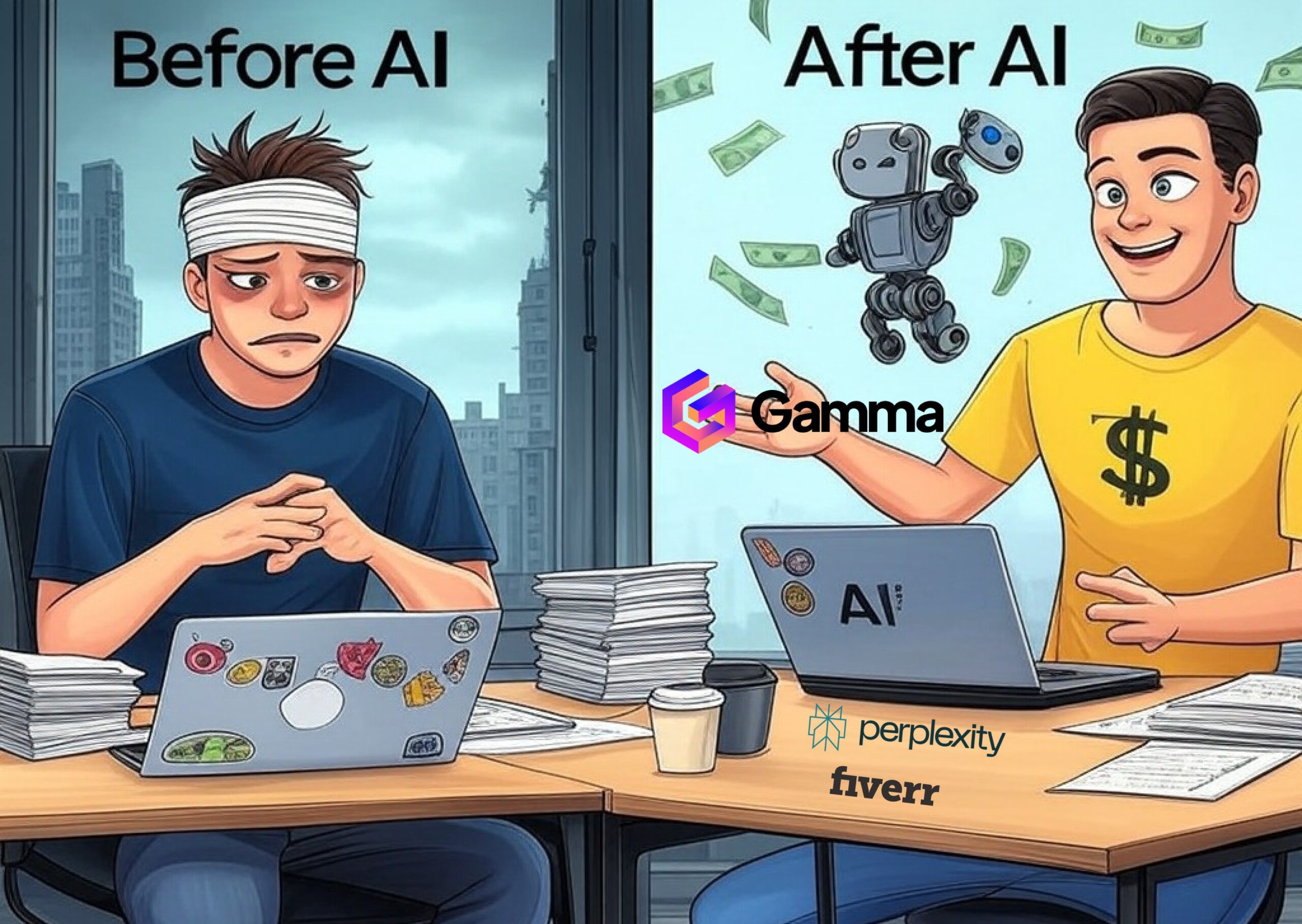Table of Contents
What is Artificial Intelligence

Artificial Intelligence (AI) refers to computer systems designed to perform tasks that typically require human intelligence. Much like the human brain, AI systems can learn from experience—often referred to as “training”—adapt to new inputs, and improve their performance over time. These capabilities allow AI to handle complex tasks such as problem-solving, decision-making, and creative content generation. The field of AI has evolved rapidly, leading to advanced applications that impact various industries, from healthcare and finance to entertainment and marketing.
One of the most prominent branches of AI today is Generative AI, which creates new content by analyzing patterns in existing data. Examples include text generators like ChatGPT, image creators like DALL-E, and coding assistants like GitHub Copilot. These tools can produce human-like text, realistic images, and even functional code, revolutionizing how content is developed. Another key area is Machine Learning (ML), where algorithms analyze large datasets to make predictions or decisions without explicit programming. AI-powered art and writing tools rely on ML to detect patterns in human-created content and replicate them in new ways.
A more advanced subset of ML is Deep Learning, which uses multi-layered neural networks to process complex data. This technology enhances capabilities like image and speech recognition, enabling innovations such as facial recognition systems, voice assistants, and autonomous vehicles. As AI continues to advance, its applications expand, offering new opportunities for automation, efficiency, and creativity across multiple fields. Understanding these foundational concepts is essential for exploring how AI can be leveraged for business and monetization.
Artificial Intelligence in Ecommerce: The Future of Online Selling

Artificial Intelligence is transforming the ecommerce industry, making it faster and more accessible to launch and grow an online business. Unlike the past, where technical skills and large budgets were essential, AI-powered tools now automate everything from store setup to product listings. This allows entrepreneurs to focus on branding and customer engagement rather than backend logistics. With AI handling repetitive tasks, businesses can scale efficiently while maintaining a professional and personalized shopping experience.
Studies predict that AI will contribute $8.65 billion to the ecommerce sector by 2025, opening new revenue streams for innovative sellers. Many entrepreneurs are already earning thousands per month by leveraging AI for product selection, marketing, and store optimization. The secret lies in combining automation with human insight—using AI to streamline operations while applying your unique understanding of customer needs and market trends.
For instance, platforms like Shopify’s AI store builder allow users to create a fully designed online store in minutes. Simply describe your business or products, and the AI generates custom themes tailored to your niche. You can then refine these designs to match your brand identity, ensuring a professional look without hiring a developer. AI also assists in writing product descriptions, optimizing SEO, and even predicting sales trends—giving sellers a competitive edge.
As AI continues to evolve, its role in ecommerce will expand, offering even smarter tools for inventory management, dynamic pricing, and customer personalization. By adopting these technologies early, businesses can stay ahead of the competition and capitalize on the growing digital marketplace.
Artificial Intelligence in Software Development: Faster, Smarter Coding
AI is transforming software development by automating code generation, eliminating the need for manual, line-by-line programming. Developers can now leverage AI-powered tools to build applications faster, reducing development time and costs. Freelancers and software engineers can take advantage of these tools to deliver high-quality programs efficiently, making AI-assisted development a lucrative career path.
Beyond just writing code, AI can enhance software with intelligent features. For example, developers can integrate machine learning models into applications—such as automated bookkeeping systems that analyze ledger entries and generate financial reports. AI also helps with debugging, optimizing performance, and even suggesting architectural improvements.
As AI coding assistants like GitHub Copilot and ChatGPT advance, they enable both experienced programmers and newcomers to create sophisticated software with minimal effort. This shift allows developers to focus on innovation rather than repetitive tasks, accelerating the delivery of cutting-edge solutions. The future of software development lies in human-AI collaboration, where creativity meets automation to build smarter, more efficient applications.
Artificial Intelligence-Powered Data Analytics: Unlocking Smarter Business Insights
AI is revolutionizing data analytics by combining deep learning, natural language processing (NLP), and computer vision to extract powerful insights from complex datasets. These technologies enable businesses to uncover hidden patterns, automate reporting, and generate predictive models—turning raw data into actionable intelligence.
Companies across industries now rely on AI-driven analytics to optimize operations, enhance customer experiences, and identify new revenue streams. Tools like RapidMiner, DataRobot, and Domino help organizations process vast amounts of data efficiently, delivering visualizations and recommendations that drive strategic decisions.
For entrepreneurs and consultants, offering AI analytics services presents a lucrative opportunity. Businesses are willing to pay for predictive analytics, sentiment analysis, and real-time trend forecasting—capabilities that traditional methods can’t match. Whether improving supply chains, personalizing marketing, or detecting fraud, AI-powered analytics provides a competitive edge in today’s data-driven world.
By integrating AI into data analysis, professionals can deliver faster, more accurate insights while reducing manual effort—making it an essential tool for modern enterprises.
Artificial Intelligence Chatbots & Virtual Assistants: The Future of Customer Service
The demand for AI-powered chatbots and virtual assistants is surging as businesses seek smarter ways to engage customers. Unlike human agents, AI chatbots can process thousands of inquiries per minute—delivering instant, accurate responses 24/7 while dramatically reducing operational costs.
Entrepreneurs and developers can capitalize on this trend by creating customized chatbot solutions for businesses across industries. Modern AI chatbots go beyond scripted replies, using natural language processing (NLP) to understand context, personalize interactions, and even handle complex transactions. From e-commerce stores to healthcare providers, organizations are investing in these virtual assistants to improve response times, boost customer satisfaction, and scale support effortlessly.
Platforms like ChatGPT and Dialogflow make it easier than ever to build intelligent chatbots without extensive coding knowledge. By offering tailored chatbot services—whether for lead generation, technical support, or appointment scheduling—you can help clients transform their customer experience while generating recurring revenue.
As AI continues to advance, chatbots are becoming indispensable tools for businesses looking to stay competitive in our fast-paced digital world.
Artificial Intelligence Content Creation: Revolutionizing the Writing Industry
AI-powered writing tools have transformed content creation through advanced natural language processing (NLP) that produces remarkably human-like text. Freelance writers now leverage AI assistants to brainstorm ideas, draft content faster, and take on more clients – significantly boosting productivity and income without extra workload. Platforms like ChatGPT and Google Gemini enable creators to generate high-quality drafts in minutes, freeing up time to focus on strategic editing and client communication.
However, the rise of AI-generated content has created new opportunities beyond writing itself. As businesses increasingly adopt AI for mass content production, skilled editors are in high demand to refine outputs for quality, brand voice, and factual accuracy. This emerging niche allows language professionals to monetize their expertise by polishing AI-generated drafts – adding crucial human judgment where algorithms fall short.
The modern content landscape now operates as a powerful human-AI partnership: writers use tools to scale their output, while editors ensure the final product meets professional standards. Whether creating with AI or perfecting its output, professionals who adapt to this new paradigm can build lucrative careers in the evolving world of digital content.
Artificial Intelligence Graphic Design: Revolutionizing Visual Creation
AI-powered design tools are transforming the graphic design industry by enabling rapid creation of professional-quality visuals. Platforms like Midjourney and DALL-E allow designers to generate stunning digital artwork—from corporate logos to merchandise graphics—simply by describing their vision in text prompts. This revolutionary approach slashes production time while maintaining creative control, as designers can refine AI-generated concepts with their editing expertise.
The AI design process begins with a simple text description, which the tool interprets to produce multiple visual options. Designers can then select and customize the best output, combining AI efficiency with human artistry. Tools like Adobe Sensei and Canva’s AI features further enhance workflow by suggesting layouts, color schemes, and design elements—streamlining the entire creative process.
For freelancers and agencies, AI graphic tools present lucrative opportunities to scale services. Designers can take on more clients by using AI for initial concept generation, then applying their skills to perfect the final product. As AI continues to advance, it’s becoming an indispensable assistant that amplifies human creativity rather than replacing it—ushering in a new era of efficient, high-quality visual design.
Artificial Intelligence Website Creation: Professional Sites in Minutes
AI-powered website builders are revolutionizing web development by enabling anyone to create professional, customized sites in record time. Whether you need an ecommerce store, portfolio, or business website, AI tools can generate complete layouts with just a few prompts – no coding required. Platforms like Wix ADI, Framer AI, and Hostinger’s website builder analyze your requirements to automatically design responsive, visually appealing pages tailored to your specific needs.
For freelancers and agencies, AI website creation presents a lucrative opportunity to scale services. You can deliver client sites faster by using AI for initial structure and design, then applying your expertise to customize branding and functionality. Entrepreneurs also benefit by quickly launching their own professional sites without technical hurdles or expensive developers.
The process is simple: describe your website purpose, preferred style, and key features. The AI generates multiple design options complete with suggested content, which you can refine and personalize. As these tools continue advancing, they’re making high-quality web design accessible to everyone while allowing professionals to focus on strategic customization rather than repetitive coding tasks.
Artificial Intelligence in Digital Marketing: The Smart Way to Grow Your Business
Artificial Intelligence has become an indispensable asset in modern digital marketing, transforming how brands connect with audiences and optimize campaigns. Today’s AI-powered tools can handle nearly every aspect of online promotion—from content creation and social media management to predictive analytics and conversion optimization. These intelligent systems combine data analysis with automation to deliver targeted, high-performing marketing strategies at scale.
For content creation, AI assists marketers in generating blog posts, social media captions, and ad copy while maintaining brand voice consistency. Tools like Jasper and Copy.ai help overcome writer’s block and maintain a steady content pipeline. When it comes to advertising, AI algorithms analyze consumer behavior to optimize ad placements, budgets, and targeting in real-time—maximizing ROI on platforms like Google Ads and Facebook.
Search engine optimization has also been revolutionized by AI, with tools like MarketMuse and Frase analyzing top-ranking content to recommend strategic improvements. For social media management, AI solutions can schedule posts, suggest optimal posting times, and even generate visual content. Perhaps most impressively, AI-powered chatbots now provide 24/7 customer engagement, qualifying leads and boosting conversions without human intervention.
The most successful AI marketing campaigns begin with human strategy—establishing brand guidelines, core messages, and campaign objectives. AI then amplifies these foundations by testing countless variations, identifying high-performing patterns, and automating repetitive tasks. This powerful combination allows marketers to focus on big-picture strategy while AI handles execution and optimization.
As AI technology continues advancing, its role in digital marketing will only grow more sophisticated. Early adopters who learn to leverage these tools effectively will gain a significant competitive advantage in today’s fast-paced digital landscape.
